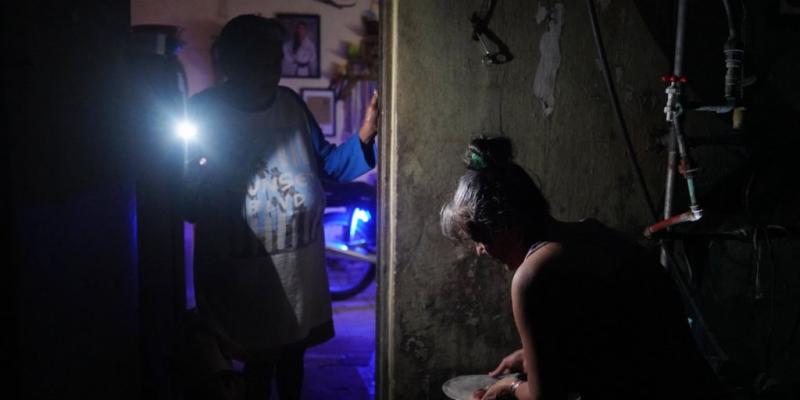Slow progress after Cuba's electrical grid collapses twice in 24 hours
Category: News & Politics
Via: perrie-halpern • 6 months ago • 6 commentsBy: Orlando Matos and Carmen Sesin



HAVANA — Some progress has been made in reestablishing power throughout Cuba, but most of the island remained in the dark Saturday after the electrical grid collapsed twice in 24 hours.
The power initially went out on the entire island around 11 a.m. Friday after its largest power plant, Antonio Guiteras thermoelectric, failed. Almost all of Cuba's 10 million inhabitants were in the dark.
As electricity was being restored another total collapse of the electrical grid occurred around 6:15 a.m. Saturday, alarming many across the country.
In the midst of the repairs, Hurricane Oscar formed off the coast of the Bahamas, triggering Cuba's government to issue a hurricane watch for the provinces of Guantanamo, Holguin, and Las Tunas in the eastern part of the island.
On Saturday there were few cars in the streets of the capital, Havana. Traffic lights were not working. People were out looking for food since much of what they had in the refrigerator is now spoiled. A limited number of stores were open. Some state-run stores opened without power while some of the privately owned ones were operating with generators.
In the upscale Vedado neighborhood of the capital, the government opened an open air market at a park on Saturday with agricultural products including root vegetables, rice and some vegetables.
In Old Havana, residents expressed frustration and anxiety over the situation.
"I pray this is resolved as fast as possible because it's unbearable," said Alexia de la Cruz, while standing outside her home. "The situation has become very dire."
Her neighbor, Luis Utria, said "the situation is intolerable. Bad enough to explode."
Others pointed to political solutions to Cuba's ongoing problem with blackouts.
"This problem can be solved by making an agreement with our closest country, [the U.S.] which we do not want to be friends with or make any concessions to," said a 74-year-old man who declined to give his name.
On Saturday, Reuters observed a small group of people banging pots and blockading a road in Marianao on the outskirts of the capital. The protesters scattered when police arrived.
Power outages have been chronic in Cuba for years and have worsened in recent months.
Before the Friday collapse, the government had tried to avoid a total blackout by closing schools and keeping most state workers home to conserve energy, but it wasn't enough.
The communist-run country's aging and crumbling infrastructure require constant maintenance, and the government has often blamed the decades-old U.S. embargo on Cuba for making it difficult to import parts.
The government has also cited increasing energy demand and fuel shortages used to fire up its plants as causes for constant blackouts. In some provinces outside the capital, Havana, many people have grappled with power outages that last up to 20 hours at a time.
On Friday night's state-run newscast, President Miguel Diaz-Canel said no one would rest until electric service is re-established. He blamed the U.S. embargo on Cuba for the lack of fuel and hard currency it needs. He warned that after the power is re-established, blackouts throughout the country will continue regularly.
Cuba's foreign minister, Bruno Rodriguez, reiterated that message on X on Saturday. He said the damage done by the embargo in 18 days is equivalent "to the annual cost of maintaining the national electro energetic system." He said there wouldn't be blackouts if the embargo were removed. "The U.S. government could support the people of Cuba ..., if it wanted.
Cuba has been in the midst of an economic crisis spurred by tightened U.S. sanctions under former President Donald Trump's administration and the devastating effect the pandemic had on tourism on the island, one of the most lucrative sources of revenue for the government.
The state-dominated economy relies mostly on imports and with the lack of hard currency, Cubans have been dealing with shortages in food, medicine, water and fuel.
The supply of oil has been greatly limited after Cuba's ally and main oil supplier, Venezuela, decreased the amount of shipments it sends to the island. Other countries that have supplied oil in the past, like Russia and Mexico, have also diminished shipments.
Cuba's economic crisis has spurred massive migration. Over one million people, or 10% of Cuba's population, have fled the island between 2022 and 2023, according to the country's national statistics office.

Tags
Who is online
56 visitors

Yep! All is not well in this communist utopia.
And they blame the US for their problems. Free and fair elections might make a dent in their problems, but a long of damage has been done.
LOL. Guess I needed to put an /s on that.
Indeed. They want to blame the U.S. but don't want to work with the U.S.? Don't want to be friends with us, don't want to make concessions to, don't want to engage in negotiations with...
I may not agree with the embargo that has been in place for the past 60 years, but neither side has made any effort to try to change things.
Canada has never had a problem with Cuba. America's paranoia about Communism is really a problem for America, isn't it.
They must be on the same grid as Texas.